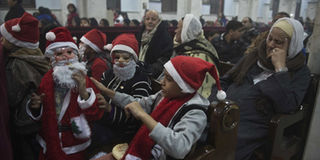Egypt parliament adopts disputed law on churches

Egyptian Coptic children dressed in Santa Claus attend the New Year Mass service at the Virgin Mary Coptic Christian church in Cairo's working class neighbourhood of Al-Warrak on December 31, 2013. AFP PHOTO | KHALED DESOUKI
CAIRO, EGYPT
The Egyptian parliament on Tuesday adopted a law on regulating the construction of churches, despite opposition by some members of the Christian community, which complains of discrimination.
Egypt's Copts, the Middle East's largest Christian minority, have long struggled to obtain official permission to build places of worship.
They find it especially difficult to erect churches south of Cairo, where even the rumour of Christians building one can spark mob violence.
"The parliament adopted the bill presented by the government for the construction and restoration of churches by a two-thirds majority," the parliament's website reported.
The new law stipulates that provincial governors will be authorised to issue permits to build churches and that they must respond within four months to each application, lawmakers told AFP.
In the case of refusal, the community may appeal the decision to the administrative court.
The construction of churches in Egypt is still governed by a ministerial decree dating back to 1934.
Ishak Ibrahim, a researcher at the Egyptian Initiative for Personal Rights, criticised the lack of transparency in the debates that preceded the adoption of the new law.
"The law was decided by the authorities and a limited number of clergy. Of course they do not represent all Christians," said Ibrahim.
"Members of parliament were not given a chance to propose amendments for some items, with their requests being ignored with the excuse that it is to reach consensus."
UNIFIED PLACES OF WORSHIP
He also noted the absence of a unified places of worship law that would govern both the construction of churches and mosques, noting that legislation concerning the mosques is more lenient.
Copts, who make up about 10 per cent of Egypt's population of 90 million, have faced persecution and discrimination that spiked during the 30-year rule of Hosni Mubarak, who was toppled by a popular uprising in 2011.
Dozens have been killed in recent years in sectarian attacks and clashes throughout Egypt.
There are about 2,869 churches in Egypt.
In rural and poor areas, the faithful who are deprived of churches are often forced to pray in their homes and are sometimes attacked by Muslim neighbours.
Authorities often refuse to issue building permits for churches on the grounds that doing so would disturb the peace with their Muslim neighbours.





